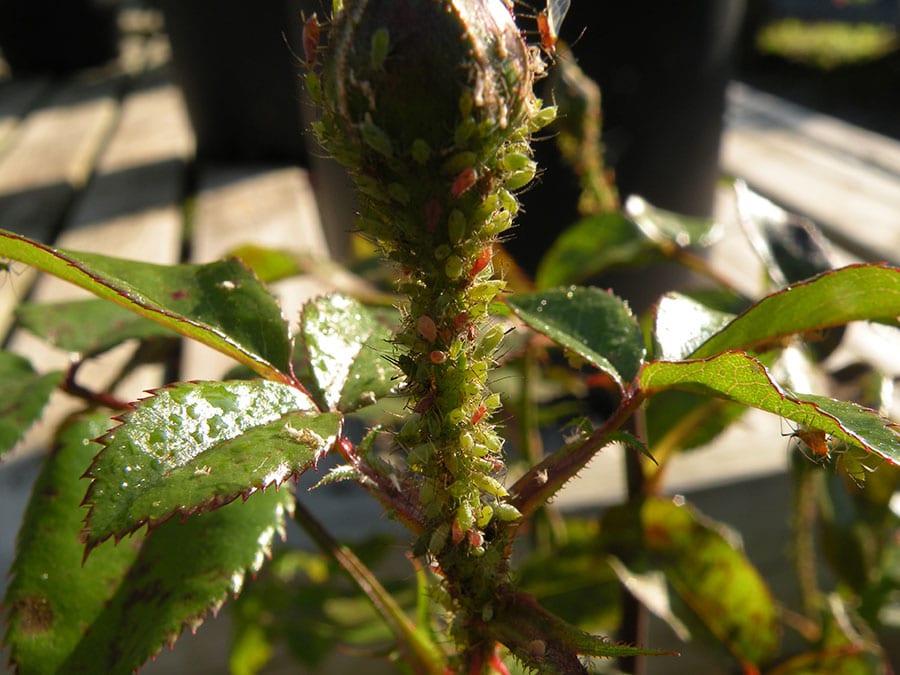
Dormant oils were originally developed centuries ago to combat stubborn scale and mite infestations on fruit trees. At first, these oils were heavy and poorly refined, making them unsafe to use on woody plants after they had broken winter dormancy. Nowadays, horticultural oils are lightweight and highly refined (and can even be used at diluted rates during the summer), so the term “dormant oil” now refers to the time of application, rather than to a particular type of oil.
Dormant oils are especially useful for treating overwintering eggs of insects that curl leaves in the spring (such as aphids), the overwintering eggs of tent caterpillars and leaf rollers, mites that overwinter on conifers, and scale nymphs and adults. These oils kill pests by either blocking the spiracles through which they breathe or interfering with their metabolism. Using horticultural oils in favour of insecticides is now widely recommended, since oils pose little risk to humans, other mammals, birds or beneficial insects; don’t cause pests to build up a chemical resistance; evaporate quickly; and can be applied using existing spray equipment (always follow package directions to the letter).
The majority of dormant oils available commercially are refined petroleum products (mineral oils) that are filtered, distilled and de-waxed before they’re combined with an emulsifying agent, which allows the oil to be mixed with water before spraying. Dormant oils can be applied from late winter until two weeks before buds open. Be sure that the temperature will remain above freezing for at least 24 hours and that there isn’t any precipitation in the forecast. Spraying on a dry, sunny morning facilitates fast drying.
Many of the new, lighter horticultural oils are also suitable for summer use to combat adelgids on conifers, aphids, leafhoppers, mites, scale insects, whitefly and powdery mildew; they’re also effective in preventing aphid-transmitted diseases.
Sensitive trees and shrubs
However, not all trees and shrubs tolerate dormant oil; those that are sensitive include:
- Japanese maple (Acer palmatum and cvs.)
- Red maple (A. rubrum and cvs.)
- Sugar maple (A. saccharum and cvs.)
- Hickory (Carya spp. and cvs.)
- Eastern redbud (Cercis canadensis and cvs.)
- Smokebush (Cotinus spp. and cvs.)
- Japanese cedar (Cryptomeria japonica and cvs.)
- Beech (Fagus spp. and cvs.)
- Japanese holly (Ilex crenata and cvs.)
- Walnut (Juglans spp. and cvs.)
- Blue junipers (Juniperus, blue cultivars)
- Norway spruce (Picea abies and cvs.)
- Dwarf Alberta spruce (P. glauca ‘Conica’)
- Colorado spruce (P. pungens and cvs.)
- Eastern white pine (Pinus strobus and cvs.)
- Douglasfir (Pseudotsuga menziesii and cvs.)
- Red oak (Quercus rubra and cvs.)
- Yew (Taxus spp. and cvs.)
- Cedar (Thuja spp. and cvs.)









Is there a time period that the sulphuric/ oil mixture will keep once mixed? I mixed way too much
Is the mixing of sulphur with the oil a good thing or is that only for specific applications ?
Great article, even though I read it in Sept, not April! I will remember this come April. I used dormant oil on my apple tree and roses in spring & I do think it kept the aphids at bay until the prairie drought allowed them to get out of hand. Will persevere next spring with dormant oil!
Well that is really good information. I have to ask “What about the red lily beetle?” My thought would be to spray the ground and the young plants as soon as the lily appears. Any suggestion?
Did you try it on the red lily bug? I use diatomaceous earth.
Share this news with the world!! I am a professional horticulturist and i am getting ready to spray roses, thinking that everyone needs to spray their roses and how does someone remind them that the time is neigh? Publishing the news in Garden Making works. Mr. Westcott-Gratton, thanks for spreading the word.
Great magazine full of trustworthy techniques.
Thank you for a very timely article. I now know more than I did before and that is a good thing for sure…